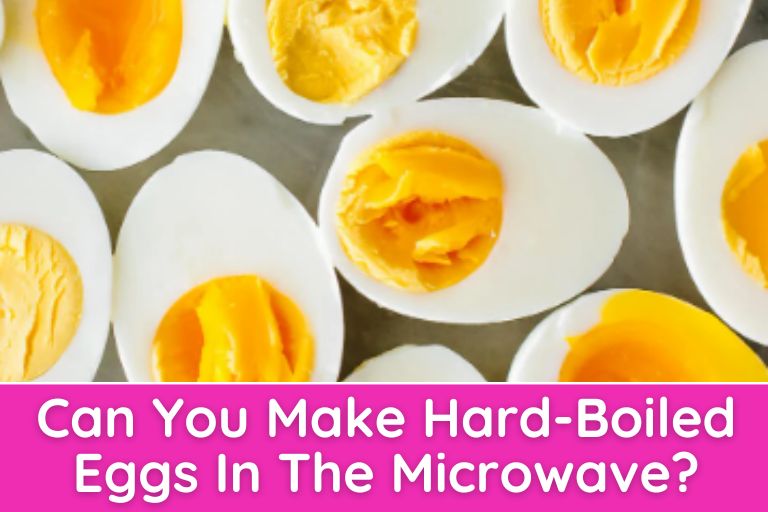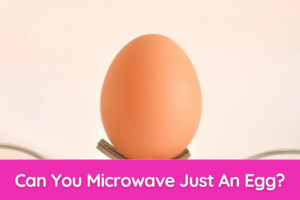Are you short on time but craving a delicious and nutritious hard-boiled egg? Look no further than your trusty microwave! With just a few simple steps, you can easily make perfectly cooked hard-boiled eggs in a fraction of the time it takes to boil them on the stove.
This blog post will walk you through the process and share tips and tricks to ensure your eggs come out ideally every time. So why wait? Let’s get cracking and learn how to make hard-boiled eggs in the microwave!
Can You Make Hard-Boiled Eggs in the Microwave?
Yes, it is possible to make hard-boiled eggs in the microwave. To do this, you will need to fill a bowl with water and place the eggs. Heat for about three and a half minutes, then remove the eggs and place them in an ice bath to cool down and stop the cooking process. Once cooled, remove the shells of your hard-boiled eggs!
How do you hard-boil eggs in the microwave?
Here’s how to make hard-boiled eggs in the microwave:
- Place up to six eggs in a microwave-safe bowl, and fill the bowl with about an inch of cold water.
- Cover the bowl with plastic wrap or a lid, and puncture a few holes for steam to escape.
- Microwave the eggs between 3-7 minutes on high power, depending on how cooked you like them (3 minutes will give you softer eggs, 7 minutes harder).
- Once done, immediately run cold water over the boiled eggs until they are excellent.
- Peel and enjoy!
Why shouldn’t you microwave hard-boiled eggs?
Here are a few reasons why you shouldn’t microwave hard-boiled eggs:
- Microwaving eggs can cause them to explode, making for a massive mess in your microwave.
- Overcooking the eggs in the microwave can produce rubbery or tough eggs that don’t look or taste as good as their boiled counterparts.
- Microwaving your eggs may lead to uneven heating and lack of flavour since no boiling process is involved.
- Salmonella contamination is risky if the eggshells are cracked when microwaving, which can lead to food poisoning if consumed.
How do you microwave an egg without it exploding?
Here’s how to safely microwave an egg without it exploding:
- Start by piercing the eggshell in several places with a needle or a safety pin. This will allow steam to escape, reducing the pressure and preventing the egg from exploding.
- Place the egg in a microwave-safe bowl and cover it with plastic wrap or a lid, ensuring holes are punctured for steam to escape.
- Microwave on high power for 30-45 seconds, depending on how cooked you like your eggs (30 seconds will give you softer eggs).
- Once done, immediately run cold water over the boiled eggs until they are cool enough to touch.
- Peel and enjoy!
What’s the fastest way to hard boil an egg?
The fastest way to hard boil an egg is in the microwave! Here’s how:
- Start by filling a microwave-safe bowl with water until it’s just enough to cover the eggs.
- Place the eggs into the water and make sure that each egg is submerged in the water.
- Cover the bowl with plastic wrap or a lid, ensuring holes are punctured for steam to escape.
- Microwave on high power for 4 minutes or until boiling starts (depending on your microwave).
- Once done, immediately run cold water over the boiled eggs until they are cool enough to touch and enjoy!
What is the best way to microwave an egg?
The best way to microwave an egg is with water and a pinch of salt! Here’s how:
- Start by taking a mug or microwave-safe container, adding two tablespoons of water and a bit of salt.
- Gently crack the egg into the container, careful not to break the yolk.
- Cover the container with plastic wrap or a lid, ensuring holes are punctured for steam to escape.
- Microwave on high power for 1 minute or until it is done to your desired level (depending on your microwave).
- When done, immediately run cold water over it until it is cool enough to touch and enjoy!
Why does salt prevent eggs from exploding in microwaves?
Salt helps to prevent eggs from exploding in microwaves because it helps to absorb the moisture and steam build-up when eggs are heated. Salt also helps lower the egg whites’ temperature, so they cook more evenly without drying out or cracking. This prevents the egg from overexposing itself to heat, resulting in an explosion.
Are 20 minutes enough for hard-boiled eggs?
Generally speaking, 20 minutes is usually enough time to cook hard-boiled eggs. However, the cooking time may vary depending on the size and number of eggs and your microwave settings. It’s best to start with a 5-minute interval, then check if they are done and adjust the cooking time accordingly.
How many minutes for hard-boiled eggs?
Generally speaking, it takes about 20 minutes to cook hard-boiled eggs. However, the exact cooking time may vary depending on the size and number of eggs and your microwave settings. It’s best to start with a 5-minute interval, then check if they are done and adjust the cooking time accordingly.
What happens to an egg in a microwave?
When an egg is placed in a microwave, the heat causes water molecules in the egg to vibrate and move around at an accelerated rate. These rapid movements create friction and pressure, which cause the egg to cook from the inside out. The result is a boiled egg that can be eaten either hard-boiled or scrambled.
What is more healthy, a boiled egg or an omelette?
Both boiled eggs and omelettes can be healthy options for meals, depending on what ingredients you use. Boiled eggs are lower in calories, fat, and saturated fats, while omelettes usually include additional elements that can provide more vitamins and minerals. It’s best to choose whichever option suits your needs the most.
Why did a boiled egg explode in the microwave?
A boiled egg can explode in a microwave if it is heated for too long or at too high of a setting due to the expansion of steam within the egg. This causes a pressure build-up until, eventually, the egg will explode from the heat and this pressure.
Why do eggs turn GREY when microwaved?
Eggs turn grey when microwaved due to a chemical reaction. The protein in the egg reacts with heat and water, producing a greyish-green film on the egg’s surface. This is harmless but can be avoided by cooking low-power eggs for shorter periods.
Does the egg need water when cooked in the microwave?
Yes, the egg needs water when cooked in the microwave. Adding a bit of water to the egg before cooking helps prevent it from drying or becoming rubbery. This also helps to create steam that will help the egg cook faster and more evenly.
Conclusion
Making hard-boiled eggs in the microwave can be a quick and easy way to enjoy this tasty treat. By adding two tablespoons of water with a pinch of salt to your mug or other microwave-safe containers, you can gently crack the egg without breaking the yolk and cook it on high power for 1 minute or until done.
While there are some tips to consider, such as using low power settings for shorter cooking times, following these steps can help ensure that your boiled eggs turn out perfectly every time!
Have you tried making hard-boiled eggs in the microwave? We’d love to hear about your experience – let us know what worked best for you!




